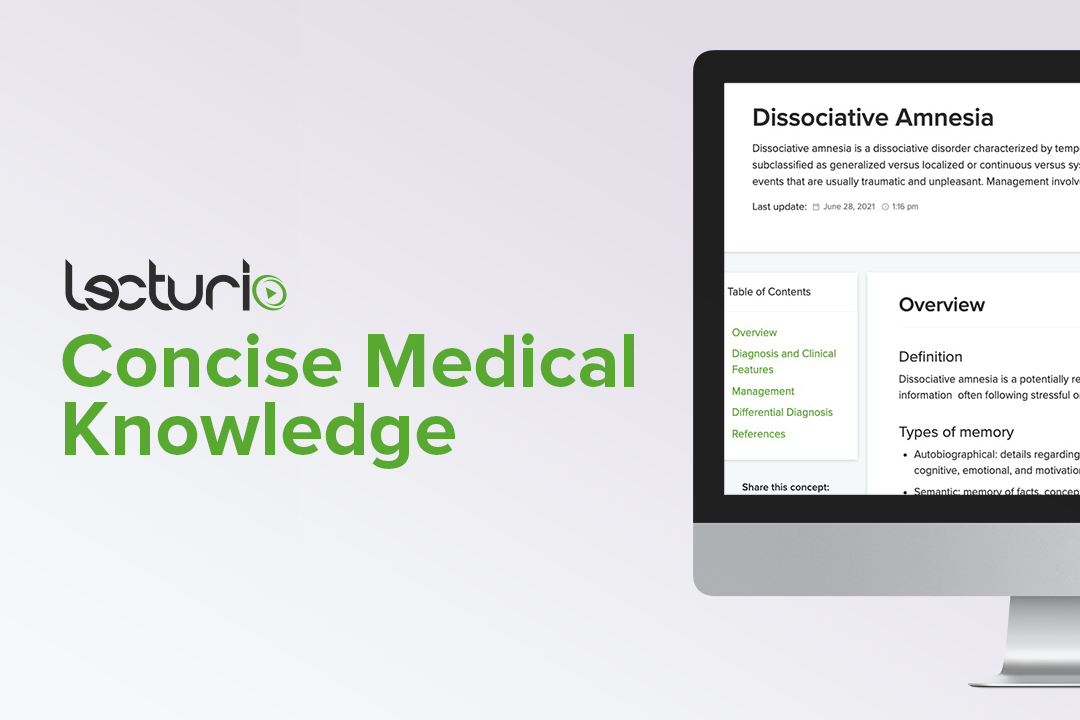Playlist
Show Playlist
Hide Playlist
Dissociative Fugue
-
Slides DissociativeFugue Psychiatry.pdf
-
Download Lecture Overview
00:00 I mentioned dissociative fugue when talking about the dissociation overview and also dissociative amnesia. So, let’s review what fugue means in more detail now. Dissociative fugue affects a subset of patients with generalized dissociative amnesia. It’s marked by purposeful and sudden unexpected travel from home or bewilderment wandering that is associated with amnesia or identity and more important autobiographical information. Patients will often assume an entirely new identity when they travel and sometimes will even take on a whole new occupation after arriving in their new location. Patients are unaware of their amnesia and new identity and they never recall the period of the fugue once it’s over. So, here’s an important point. If you encounter a patient who has traveled from far away and has assumed a new identity, you should be thinking in your differential about a dissociative fugue. It’s a rare disorder, the actual prevalence isn’t known, but some predisposing factors include heavy alcohol use, major depression, head trauma or seizure, and a stressful life event. Remember our case study that we reviewed earlier in the overview about Alice. So, she has traveled over 300 miles, has taken on a new identity and really can’t remember anything about herself. The only thing she is able to share are details about her nephew’s 10th birthday party. So, what is your differential diagnosis at this point for Alice? Well, you’re going to be thinking about a substance-induced disorder, general medical conditions which of course are very important to rule out, normal limitations on memory. You’re going to think about cognitive disorders, all the psychotic spectrum disorders as well as personality problems, acute and posttraumatic stress disorder. You’re going to think about all of the dissociative disorders, factitious disorder and also secondary gain like malingering. So, what would you do if you encounter a patient like Alice whom you are suspecting may have a dissociative fugue going on? Well, you’re probably going to consult with a psychiatric service for further workup and check Alice out to make sure she doesn’t have an acute psychiatric decompensation. Now, of course, this is after you’ve ruled out the substance issues and possible general medical conditions that could be happening. Then, you’re going to seek out an expert to perform a mental status exam and do thorough cognitive testing. You’re going to screen Alice for safety and also for her ability to care for herself. So, you’re going to go through a suicide risk assessment, ask her about homicidal ideation and how she is meeting her day-to-day needs in life. The psychiatric assessment will, of course, include a medical history and psychiatric history. You’re also going to want a collateral review of old records or to talk with someone who knows this patient better than you do. You’ll do a mental status exam, probably find that her affect is a bit bewildered or aloof, you’ll do the cognitive screening, and you’ll do some lab work and brain studies including baseline labs like a complete blood count, checking kidneys and liver, checking the thyroid hormone, doing a urine tox screen, probably a pregnancy test as well in case you decide to put her on medications. You’ll do head imaging, maybe a head CT or an MRI, and you’ll do an EEG if there are focal neurological findings. So, there are some questions you’re going to want to keep pursuing with Alice as well. Here are a few things you might ask her. Ask her about gaps in her memory, any signs that she’s missing parts of her memory or missing out on important events in her life. Ask her if she remembers some part of life being better than others alluding to whether or not there has ever been a trauma. Ask if it’s frequent that she loses periods of time, if she has ever had any blackouts, and ask her of course if she feels safe. So, let’s take this case a little bit further. You find out a little bit of Alice’s information because you retrieved some info from her personal belongings and you also find an emergency contact number in her phone. You're able to talk with her contact and you learn that Alice’s nephew was recently killed in a motor vehicle accident right after his birthday party. The family have been worried about Alice. She’s been missing for weeks. You also learn that she experienced a number of repeated traumas herself as a child, and she has actually suffered from untreated depression for quite a lot of her life. So, at this point, what is your diagnosis that’s most likely for Alice? So, you’re probably thinking dissociative amnesia with fugue. In summary, dissociative amnesia is the inability to recall important biographical information. There is an experience of significant distress from memory loss. It’s not due to substances or neurological, medical, or brain injury, and it’s not better explained by a dissociative identity disorder, PTSD, acute stress disorder, or really any other psychiatric or cognitive disorder. So, what’s the difference between dissociative amnesia and fugue? Well, here’s one thing. In dissociative amnesia, patients are aware that they have forgotten something. They’re usually not aware of this in the fugue state. In dissociative amnesia as well as in dissociative fugue, patients are rarely bothered by their symptoms. 06:03 Often, dissociative amnesia and fugue will spontaneously recover within minutes, hours, or days, so sometimes it’s a matter, in terms of treatment, of being supportive to the patient as this condition will often pass on it's own. 06:19 As a historical point sometimes hypnosis or the administration of sodium amobarbital during the interview can be helpful and useful to patients encouraging them to talk more freely, but this isn't done in modern clinical practice. 06:35 More practically, you may give them a benzodiazepine, something like lorazepam, which is readily available, useful, and effective. 06:45 It’s important to assess a patient’s safety and ability to care for themselves when determining the level of care. So in a dissociative amnesia with fugue, you may consider hospitalization if there are safety concerns; otherwise, you’ll treat as an outpatient. You’ll come to your decision by obtaining collateral sources of information and note that after the episode resolves, the patient will usually go back to assuming their old identity and they usually don’t remember the time of the fugue. Ongoing psychotherapy is aimed at helping the patient to retrieve their lost memories in order to help prevent future recurrences and also to provide support. So, you now know a little bit more about dissociative amnesia along with the fugue state.
About the Lecture
The lecture Dissociative Fugue by Helen Farrell, MD is from the course Dissociative Disorders. It contains the following chapters:
- Dissociative Fugue
- Dissociative Fugue – Assessment
- Dissociative Amnesia
Included Quiz Questions
Which of the following statements regarding dissociative fugue is FALSE?
- The patients are aware of their amnesia and are often distressed by it.
- It affects a subset of patients with generalized dissociative amnesia.
- It is marked by purposeful and sudden, unexpected travel from home that is associated with amnesia for identity.
- Patients often assume an entirely new identity and occupation after arriving in a new location.
- It is a rare disorder with unknown prevalence.
Which of the following is NOT a predisposing factor for dissociative fugue?
- Cannabis use
- Major depression
- Stressful life event
- Heavy alcohol use
- Head trauma or epilepsy
When assessing dissociative fugue, all of the following will yield relevant information for the diagnosis, EXCEPT:
- Orientation in place, time, and person
- Gaps in your memory
- Any missing important events in life
- Any blackouts or blank spells
- If the patient feels safe
Which of the following sentences best describes the difference between dissociative amnesia and dissociative fugue?
- Patients with dissociative amnesia are aware that they have forgotten something.
- Patients with dissociative fugue are aware that they have forgotten something.
- Patients with amnesia are completely distressed by the memory disturbance.
- Fugues spontaneously resolve within minutes, hours, or sometimes within days.
- Fugues tend to occur in the young population, whereas amnesia tends to occur in the elderly.
Which of the following therapeutic options is the most useful and effective for treating dissociative fugue?
- Lorazepam
- Diazepam
- Sodium amobarbital
- Hypnosis
- Calcium carbonate
Tom, a surgeon, is diagnosed with Huntington's disease at the age of 34. Two months later, his family finds him working as a chef, and he denies ever knowing them. What condition does he likely have?
- Dissociative fugue
- Anterograde amnesia
- Depersonalization disorder
- Dissociative personality disorder
- Dissociative identity disorder
Customer reviews
5,0 of 5 stars
| 5 Stars |
|
1 |
| 4 Stars |
|
0 |
| 3 Stars |
|
0 |
| 2 Stars |
|
0 |
| 1 Star |
|
0 |
I love her lectures. Her speech is deliberate, well-paced, easy to understand her content, even when it is complex material.




